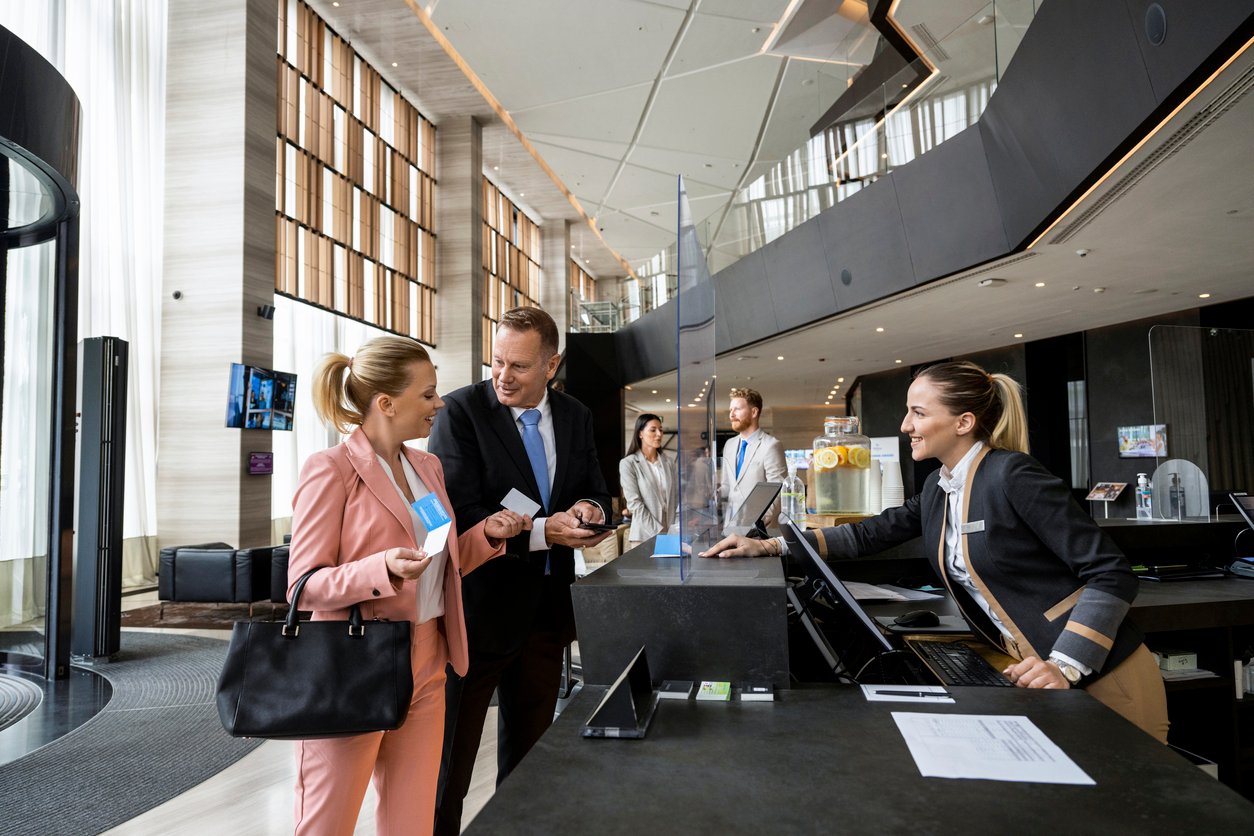Complete Guide to Hotel Dynamic Pricing and How it Works
Markets in the hotel industryconsistently fluctuate because of changes in supply and demand, usually because of...

Table of Contents
When operating businesses in the hospitality industry, you need to think quickly and efficiently. This means all the data you need to make effective business decisions must be accurate, reliable, and within reach. That’s where a cloud hotel management software solution can work its magic.
Cloud hotel management systems go beyond storing all significant data to streamlining daily operations. These tools drive excellence to your property to align with your business objectives and meet your client's needs. And because the software is cloud-based, expect improved safety and better functionality compared to on-premise and traditional management systems.
However, despite the advantages of leveraging cloud-based hotel management software, 8% of hoteliers still opt for an on-premise PMS for personal reasons. These hotel owners are still reluctant to upgrade, causing them to lose the opportunity to increase profit margins. If you’re still one of them, this guide is for you.
Let’s discuss cloud hotel management software solutions, their benefits, features, and why HouseCount RMS can change the game's name.
Cloud-based hotel software utilizes a remote server readily accessible as long as you have a stable internet connection. It streamlines and automates daily operations with low maintenance costs, promoting efficiency. Furthermore, cloud-based PMS takes care of various aspects of hotel tasks within a user-friendly dashboard, including the following:
With the software’s backup and recovery services, hoteliers can guarantee data will not be accidentally lost. Let’s dive deeper into the advantages of utilizing cloud-based software.
Let’s face it. The hospitality industry constantly evolves and remains dynamic, causing you to invest in new systems to adjust to seasonal demands. Thanks to cloud-based hotel management software, you can enjoy money-saving benefits while experiencing better internal operations.
Moreover, the cloud system won’t require you to pay any upfront investments for software, hardware, and IT personnel. Instead of you needing to take care of server and maintenance costs, these are taken care of by the software vendor. You just have to pay for the subscription, and that’s it, saving money in the long run. This allows hoteliers to manage their hotel’s resources and budget more efficiently.
Other cost-saving benefits of a cloud-based provider include the following:
Another benefit of cloud-based systems is you don’t need to update the software manually. The software vendor will push updates automatically, ensuring that you’re always working with the latest version of the software. . Most of the time, you can also schedule the updates during slower periods so that your operations won’t be affected at all.
Customizations are also easier with cloud-based hotel management software, allowing you to personalize the interface or integrate the system with other tech tools you need to run the hotel. Quick integration helps you streamline even better all property-wide operations.
Local networks and private internal systems are more prone to security risks and data loss. Your computer can also be a malware victim, leading to cybersecurity threats that can harm your hotel’s operations. However, having a cloud in place means your data is secure, even when the system’s internal network experiences downtime.
There is also hotel management software that offers advanced security features, such as:
Increased security also means having a safe backup location to store all your data. The next time you lose important data in the primary network, you can recover all necessary files from the encrypted backup.
Because cloud-based systems often use a web browser, these programs enable quick access whenever and wherever even when using your mobile device or tablet. This is even more important for staff members who cannot report to work or cannot afford to tie themselves to the desk 24/7. With a stable internet connection, you can effortlessly search for the resources you need, as long as they are saved in the cloud.
Moreover, because it’s cloud-based, remote hotel managers can automatically report guest inquiries or hotel issues, regardless of their current location.
For example, Luxe Pricing’s HouseCount software is entirely cloud-based as well as fully mobile, meaning that important information can be accessed at any time, anywhere. With the ability to implement set-it-and-forget-it dynamic pricing, the time savings for hoteliers are invaluable.
The dynamic nature of the hospitality industry makes real-time data reporting and analytics crucial. Real-time analytics can assist hoteliers in understanding customer behavior and guest demands, allowing them to strategize and improve the hotel’s quality of services.
Through real-time data access, hotel managers can monitor and analyze the following key metrics:
By analyzing the data, hoteliers can practice proactiveness in anticipating customer preferences and optimizing pricing strategies to enhance overall profitability.
From quicker data access to catering to guest preferences and email automation, a cloud-based hotel management system can enhance your hotel’s overall guest experience.
For instance, the cloud-based software can serve as your centralized system for all guest information. This allows your staff quicker access, especially when issues must be addressed or when you have to refer to specific guest details about their preferences.
Cloud-based software solutions also mean everything, even the most repetitive admin tasks, is automated. This makes creating feedback surveys and guest newsletters easier so you can reach out to your clients more effectively and efficiently.
As the hospitality industry continues to evolve, the right technology can significantly impact streamlining processes, optimizing resources, and elevating the overall guest experience. When seeking the ideal cloud-based solution for your hotel, carefully considering a range of features and capabilities is essential.
Even with the coming of the technological age, some hoteliers still prefer the old-fashioned way. The reason? A few software solutions are not user-friendly or intuitive enough for beginners. That’s why looking for a tool with an easy-to-navigate dashboard and interface is one of the priorities for a cloud-based management system.
Always remember that an intuitive dashboard makes everything easier because it provides convenience in streamlining your hotel’s operations. Look for the software that allows your staff to view the following within a single window:
An easy and visually appealing dashboard will help your staff manage admin tasks more efficiently, which can positively impact how you handle your guests. ntegrations with other tech systems should also be supported, especially with other popular systems on the market that hoteliers are likely to use. Many cloud hotel management software options utilize APIs for this purpose.
One of the primary benefits of using a cloud-based management system is increased security against data breaches and loss. This means the security features must also be part of what you look for before investing in a new software tool.
Ask the provider about data encryption and biometrics authentication, which are advanced security measures to ensure only your staff can access your hotel data. Security features can also include user access controls and compliance with industry standards, ensuring your hotel protects all sensitive guest information.
You’re willing to pay for a new cloud-based software tool because you want to enjoy all the features you need for your hotel. That should include choosing one with reliable and extensive customer support that can immediately respond to your issues and concerns.
When looking for a provider, evaluate the level of customer support according to its availability, responsiveness, and the quality of assistance offered.
More than finding a system that can ensure efficiency in managing hotel tasks, it’s also essential to look for one that provides features that can improve the overall experience. These can include guest communication tools, online check-in and check-out options, and other personalized services.
For example, with LuxeSell, it’s easy for your frontline staff to offer the right promotion and price to the right guest at the right time. Instead of sifting through offers and choosing the right combination on the spot, the software utilizes micro-experimentation, which means the software is constantly learning to make smarter recommendations over time.
Now that everyone is on the go, you need a software solution that can easily be accessed using only a mobile phone or a tablet. Look for a cloud-based hotel management system that allows you and your staff to access operational information, whether inside the hotel or on the go.
Moreover, mobile accessibility allows your staff to utilize their personal devices for tasks such as updating room statuses and submitting maintenance requests. Your team gains the flexibility to navigate the lobby seamlessly, bypass queues, and check in guests using tablets or phones. This is achieved without the requirement for extra interfaces or core platform upgrades.

The cloud-based hotel reservation system is another tech tool that enables your team to accept direct hotel bookings through your main website and other distribution channels. Sometimes called an online booking engine, this innovative tool can also cater to a better guest experience through the following:
Whether your property is a bed and breakfast, Airbnb, condo rental, holiday home, or luxurious five-star hotel, you’ll be missing a lot without a cloud-based hotel reservation system. Here are the main benefits of leveraging this technology:
Cloud-based hotel reservation systems significantly improve the accessibility and efficiency of your booking process. It’s now easier to manage rates, room availability, and inventory while fully integrating the system with your hotel’s other channels and platforms.
The system also allows guests to change or cancel reservations online without the need to email or call the hotel. This promotes a better customer experience because it saves resources and time for both parties.
An automated hotel reservation system can also perform repetitive administrative tasks that normally take so much of your team’s time. These tasks include accepting reservations, responding to email inquiries, and addressing booking and payment concerns.
With streamlined admin tasks, you now have more time to interact with your guests. Moreover, the system allows everyone to gain access to real-time information updates, such as details about the current guests and room occupancies.
A cloud hotel reservation system in place prevents issues like over or double-booking because your team has access to real-time room rates and availability. The system also automatically updates, which can gradually improve your hotel operations.
Having a hotel reservation system in place also enables your hotel to track all room reservations across all your distribution channels.
Cloud hotel reservation system stores all data on encrypted servers, reducing the risk of data corruption, theft, and loss. These tools also utilize authentication protocols to protect your hotel data from unnecessary and unauthorized access. You can also guarantee the system complies with current data protection guidelines, protecting your guests and their privacy.
Before we give you more reasons to invest in a cloud-based hotel management system, keep in mind that these tools come in two types: cloud-based and on-premise. The on-premise options are the more traditional, while cloud-based systems are more innovative and tech-savvy. Here’s a table comparing the two.
|
Characteristic |
Cloud-Based |
On-Premise |
|
Deployment |
Data stored in an encrypted shared server |
Data is stored in a local server, and the program is installed on each staff’s computer. |
|
System Requirements |
Internet connection and browser |
Individual desktops and local servers |
|
Data Security |
Managed by the provider |
Your responsibility to keep data safe. |
|
Maintenance |
The software provider takes care of the maintenance and system upgrades. |
System upgrades have to be updated on every individual computer. |
|
Mobile Accessibility |
Yes |
No |
We’ll dive deeper into comparing on-premise and cloud-based software later. But why should you opt for the cloud-based option?
Choosing a cloud-based hotel management system offers flexibility, accessibility, and cost-efficiency, which you can never experience with on-premise tools. Your team can streamline operations on the go and access crucial data from anywhere with a stable internet connection.
Cloud-based systems also feature scalability, allowing your property to adapt to changing business needs and client demands without extensive infrastructure adjustments. The scalability can include the following:
Ultimately, a cloud-based approach not only reduces upfront costs but also ensures continuous innovation, making it a strategic choice for modern hotels aiming for growth, security, and improved guest experiences.
Today, modern hotel management systems must monitor multiple work environments simultaneously and create reports within a single dashboard. There is no universal software for all hotels, so it’s important to know what your hotel precisely needs, including the features you must consider.
Each system's specific combination of functionalities may vary based on your needs. Nevertheless, the following are key features when evaluating a property management system:
|
Key Feature |
Relevance |
|
Front-Desk Operations and Reservations |
Streamline guest interactions, optimize room allocation, and ensure real-time access to essential information |
|
Distribution Channel Management |
Maximize visibility, optimize online presence and efficiently manage bookings across diverse channels to achieve a wider reach |
|
Housekeeping and Maintenance |
Ensure optimal room conditions, timely upkeep, and enhanced guest satisfaction |
|
Revenue Management and Strategy |
Straightforward interface for all payment matters |
The cloud-based hotel management system must integrate the reservation service, containing inventory details, with the website booking engine and various distribution channels. User-friendly dashboards must provide hotel management with real-time visibility of current and upcoming reservations, enabling efficient room allocation, check-ins, check-outs, key card issuance, payment processing, and other essential functions within a secure and comprehensive system.
This feature allows the system to monitor all your property’s online distribution channels, including travel websites, travel agents, mobile applications, airlines, and more.
The software must help your business expand its reach across the internet with the multiple channels it manages. Moreover, the software must seamlessly integrate with famous global distribution systems.
The cloud-based hotel management system streamlines manual processes and simplifies booking transactions by directly linking to the reservation system. This creates a unified interface for managing and distributing inventories across multiple channels.
This functionality covers managing current room statuses and tracking the housekeepers’ assignments for cleaning rooms by directly connecting them to the front-office task. The cloud-based hotel management system must be able to identify rooms that must be attended in preparation for the next guest.
The front desk staff can monitor the status of individual rooms and generate maintenance reports. Utilizing a cloud-based hotel PMS, housekeepers can conveniently update task or room statuses via their smartphones or tablets.
The hotel management system must include a secure interface where your staff can monitor, manage, and analyze all payments. It must facilitate online payments, automatically verify credit or debit card information, and, in the case of non-payment, aid in tracking outstanding charges.
Additionally, cloud-based hotel management software must empower hoteliers to implement flexible, data-driven revenue management strategies by monitoring key performance indicators such as occupancy, revenue per available room (RevPAR), and average daily rate (ADR). Advanced algorithms leverage historical data, competitor rates, weather, and local events to determine optimal rates.
Cloud-based hotel property management software provides a streamlined and centralized platform for managing various aspects of operations. This technology allows efficient reservation management, seamless integration with online distribution channels, and real-time updates on room availability to ensure optimal occupancy rates.
The software's ability to implement dynamic pricing strategies based on demand, competitor rates, and market trends maximizes RevPAR and ADR. Additionally, cloud-based systems facilitate improved guest experiences through online bookings, personalized services, and faster check-ins, enhancing customer satisfaction and loyalty.
The accessibility and scalability of cloud solutions enable hotels to adapt quickly to changing market conditions, optimize pricing, and implement targeted marketing strategies, ultimately driving increased revenue and overall profitability.
By offering a user-friendly and accessible platform, cloud-based hotel reservation software enhances the overall booking experience for guests to facilitate quick and seamless online reservations.
The real-time synchronization of room availability across various distribution channels ensures that potential guests receive accurate and up-to-date information. Additionally, cloud reservation software often integrates with online travel agencies and global distribution systems, expanding the hotel's visibility and attracting a broader audience.
The system's ability to implement dynamic pricing strategies based on market demand and competitor rates helps optimize room rates and attract price-sensitive guests while maximizing revenue. Convenient mobile accessibility also promotes spontaneous bookings because guests can readily reserve a room using mobile devices.
Cloud hotel management software significantly enhances hotel efficiency by streamlining operational processes. The system’s accessibility allows staff to manage tasks and reach critical information anywhere with an internet connection. This mobility promotes faster decision-making and responsiveness.
The real-time updates on reservations, room availability, and guest information enable more accurate planning and resource allocation. Automation features, such as online check-ins and automated billing, reduce manual workloads for staff, freeing up time for more personalized guest interactions.
Cloud-based systems also facilitate seamless integration with other hotel technologies, such as point-of-sale systems and housekeeping modules, creating a cohesive operational environment.
Additionally, the scalability of cloud solutions enables hotels to adapt to changing demands, whether scaling up during peak seasons or efficiently managing reduced operations during low-demand periods.
The choice between hotel cloud software and on-premise hotel software involves distinct considerations, each with its own set of advantages and limitations.
Cloud-based hotel software operates on remote servers that are accessible online. It promotes accessibility by allowing users to access data and manage operations from any location with internet connectivity, providing flexibility for staff and management.
Moreover, cloud solutions involve lower upfront costs as they eliminate the need for substantial on-site hardware investments. The subscription-based model often includes automatic updates and maintenance.
Cloud systems are also easily scalable, allowing hotels to adapt to changing needs by adding or reducing demand-based resources. The software provider is responsible for automatic updates, ensuring the system runs on the latest version.
Finally, cloud software often promotes better collaboration among hotel staff as information is accessible in real-time from various locations.
On-premise hotel software, on the other hand, is installed and operated on a local server, usually within the hotel premises. Hotels have direct control over the software and data, but security and customization may be issues.
Some hotels can perceive on-premise solutions as more secure since they have physical control over their servers. But in reality, these tools are more prone to data loss because no backup or recovery storage is available.
Hotels relying on on-premise software heavily depend on their in-house IT staff for ongoing support, maintenance, and issue resolution. This can be a challenge if the hotel lacks a dedicated IT team.
Moreover, on-premise software may not promote collaboration as effectively as cloud solutions, as access to information is restricted to the physical premises. This limitation can impact communication and teamwork among hotel staff.

If you’re a property owner, both HouseCount RMS and LuxeSell URS can be key integrations into your online property management system. For its part, Housecount RMS makes it easy for you to boost sales and maximize revenue. It also guarantees accessibility and mobility due to its online functionality and ability to integrate with your existing property management system, allowing your staff to access data and flexibly manage operations.
Plus, it keeps track of essential metrics to develop optimal room rates, improve guest experience, and boost overall revenue.
On the other hand, LuxeSell URS is a simple upselling software solution that pairs perfectly with HouseCount RMS. It makes it easy for you to provide the right offer for your guests so that they’re enticed to increase their spend, ultimately boosting your revenue.
Better yet, LuxeSell URS comes with a turnkey onboarding service, ensuring it’s properly integrated with your PMS. These two cloud management hotel software are ideal for handling revenue and upselling in conjunction with your property management system.
Cloud-based hotel management software is a giant leap for hoteliers seeking efficiency, flexibility, and enhanced guest experiences. The ability to seamlessly integrate with distribution channels, implement dynamic pricing strategies, and adapt to evolving market trends makes cloud systems essential for modern hotel management.
The decision to leverage cloud technology becomes a matter of staying competitive and a strategic move toward optimizing operations. By understanding how cloud hotel management software works and aligning it with specific business needs, hoteliers can harness the power of innovation to propel their establishments into a dynamic future.
Ready to give cloud hotel management software a try? Get a demo of Luxe Pricing’s RMS and URS systems today to see how it can impact your properties.




Get Hooked! Sign Up to get the latest catch sent to your inbox.
Markets in the hotel industryconsistently fluctuate because of changes in supply and demand, usually because of...
Regardless of your hotel’s size, the main business goal is to provide a great guest experience. Being able to...
Hotels have several departments running different operations. So, what’s the best way to keep tabs on everything that’s...